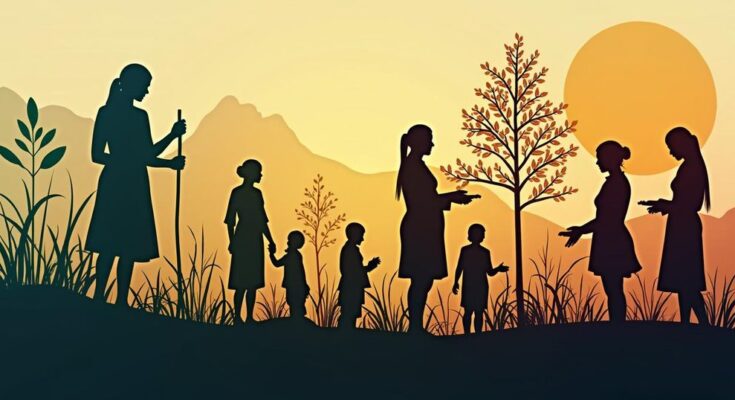This article examines the impacts of biodiversity loss and environmental crime on women from rural and indigenous communities in Ecuador, Mexico, Cameroon, and Indonesia. It discusses how illegal extractive activities threaten women’s safety and disrupt their roles within their communities. Although traditional gender roles hinder women’s participation in environmental resistance movements, there has been increased activism among women, highlighting their crucial role as environmental defenders. The article underscores the need for understanding these dynamics to foster resilience and empowerment of women in these communities.
The discourse surrounding environmental crime remains a contentious issue, encompassing the aspects of human-induced environmental degradation and the loss of biodiversity. This phenomenon severely impacts local communities, particularly indigenous populations residing in biodiverse regions characterized by forests, mountains, and marine ecosystems. Women from these communities are among the most affected, as illegal extractive activities, including mining and logging, attract external male workers and inherently lead to the ‘masculinization’ of these territories. The ensuing chaos disrupts daily life and endangers women’s safety, particularly as they often must traverse forests for domestic purposes. This policy brief, part of the Resilience Fund’s larger initiative promoting women’s resilience against organized crime, elucidates the various challenges women face due to environmental degradation and biodiversity loss caused by unlawful exploitation of forest regions. It emphasizes the susceptibility of women in indigenous communities that have deep socio-cultural and economic ties to their natural surroundings. Forest resources are perceived differently by men and women, reflecting their respective responsibilities, priorities, and needs within the household and the larger social structure. The report examines case studies from four distinct forest ecosystems: the Arajuno forests in the Ecuadorian Amazon, the Sierra Tarahumara in Mexico, the Yabassi forests of Cameroon, and the rainforests of North Sumatra, Indonesia. The findings reveal a dichotomy where indigenous communities mobilize to protect their territories from extractive threats; however, entrenched gender norms and patriarchal structures often inhibit women’s active participation and voice in these movements. Despite these challenges, there has been a gradual increase in women’s involvement in resistance efforts—especially against large-scale state concessions—leading to a growing presence of women as prominent environmental defenders in their respective communities. Motivated by a fundamental desire to safeguard their livelihoods, women are increasingly challenging prevailing narratives regarding indigenous communities through various acts of solidarity. Their resilience strategies, while inherently specific to their respective contexts, are strikingly similar across the communities studied in this exploration.
The issue of biodiversity loss and environmental crime has been increasingly acknowledged as critical to understanding the rights and roles of women in rural and indigenous communities. Both biodiversity degradation and environmental crimes are rooted in broader socio-economic and political practices that affect these communities’ livelihoods and cultural heritage. In the context of illegal extractive strategies concentrated in biodiverse territories, the encroachment often leads to gendered consequences due to the patriarchal structures prevailing in many indigenous societies. Thus, it becomes imperative to explore how women, who are largely responsible for the subsistence economy through the gathering of forest resources, navigate these changing and often hostile environments. A significant aspect of this analysis is the contrast between the motivations and methods of engagement among men and women in resisting ecological harm and defending their communities’ rights.
In summary, the exploration into the impact of biodiversity loss and environmental crime highlights the multifaceted challenges faced by women in indigenous and rural communities. While gender norms continue to undermine women’s voices in resistance movements, there is an encouraging trend of increased participation among women, who are assuming pivotal roles as environmental defenders. Their collective struggle is not merely an act of opposition to environmental degradation, but a profound effort to protect their livelihoods and maintain their cultural identities. Understanding these dynamics is crucial for developing policies that not only address environmental crime but also empower women in these vulnerable communities.
Original Source: reliefweb.int




